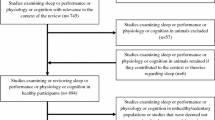Summary
This study explores whether KR (knowledge of results) and reward compensate for the negative joint effects of sleep deprivation and signal degradation in a choice-reaction task. The negative effect of signal degradation on performance was aggravated by sleep loss and time-on-task, whereas KR improved performance, especially when signals were degraded. Reward changed the effects of time-on-task owing to lack of sleep. Performance was also improved by a brief task interruption after 30 minutes' work, with 5 more minutes to go. These results can be interpreted in terms of the performance model of Sanders (1983), which links energetic mechanisms to stages of information processing. A lack of energetic supply from the arousal mechanism to perceptual processing, induced by signal degradation, sleep deprivation, and time-on-task, was effectively counteracted by KR: KR enables the mobilization of effort to compensate for this lack of arousal. The relation between reward and KR is not yet clear. The interruption effect suggests that the influence of time-on-task is not due to loss of arousal, but causes a reallocation of resources by effort.
Similar content being viewed by others
References
Boer, L. C., Gaillard, A. W. K., & Jorna, P. G. A. M. (1987). Taskomat: A battery of information-processing tasks. Soesterberg:Institute for Perception TNO, report no. IZF 1987/2 (in Dutch).
Donders, F. C. (1869/1969). On the speed of mental processes. In W. G. Koster (Ed. and Transl.), Attention and performance II (pp. 412–431). Amsterdam: North Holland.
Frowein, H. W., Gaillard, A. W. K., & Varey, C. A. (1981). EP components, visual processing stages, and the effect of a barbiturate. Biological Psychology, 13, 239–249.
Frowein, H. W., & Sanders, A. F. (1978). Effects of visual stimulus degradation, S-R compatibility, and foreperiod duration on choice reaction time and movement time. Bulletin of the Psychonomic Society, 12, 106–108.
Gopher, D., & Sanders, A. F. (1984). S-Oh-R: Oh Stages! Oh Resources!. In W. Prinz & A. F. Sanders (Eds.), Cognition and motor processes (pp. 231–253). Berlin: Springer.
Locke, E. A. (1968). Toward a theory of task motivation and incentives. Organisational behavior and human performance, 3, 157–189.
Locke, E. A., Shaw, K. N., Saari, L. M., & Latham, G. P. (1981). Goal setting and task performance: 1969–1980. Psychological Bulletin, 90, 125 -152.
Mackie, R R. (Ed.) (1977). Vigilance. New York: Plenum Press.
Pribram, K. H., & McGuinness, D. (1975). Arousal, activation and effort in the control of attention. Psychological Review, 82, 116–149.
Sanders, A. F. (1977). Structural and functional aspects of the reaction process. In S. Dornic (Ed.), Attention and performance: Vol. VI (pp. 3–25). Hillsdale, NJ: Lawrence Erlbaum.
Sanders, A. F. (1980). Stage analysis of reaction processes. In G. E. Stelmach & J. Requin (Eds.), Tutorials in motor behavior (pp. 331–354). Amsterdam: North Holland.
Sanders, A. F. (1983). Towards a model of stress and human performance. Acta Psychologica, 53, 61–97.
Sanders, A. F., Wijnen, J. J. C., & Arkel, A. E. van (1982). An additive factor analysis on the effects of sleep loss on reaction processes. Acta Psychologica, 51, 41–59.
Sternberg, S. (1969). On the discovery of processing stages: Some extension of Donders' method. In W. G. Koster (Ed.), Attention and performance: Vol. II (pp. 276–315). Amsterdam: North Holland.
Steyvers, F. J. J. M. (1987). The influence of sleep deprivation and knowledge of results on perceptual encoding. Acta Psychologica, 66, 173–187.
Steyvers, F. (1988). The utilisation of two LSI-11 systems in a multiple choice reaction task: experiment control and data acquisition. In F. J. Maarse, L. J. M. Mulder, W. P. B. Sjouw, & A. E. Akkerman (Eds.), Computers in psychology: Methods, instrumentation and psychodiagnostics (pp. 95–101). Amsterdam: Schwetz & Zeitlinger.
Steyvers, F. J. J. M. (1991). Information processing and sleep deprivation — Effects of knowledge of results and task variables on choice reaction. Haren: Traffic Research Centre VSC, University of Groningen.
Wilkinson, R. T. (1961). Interaction of lack of sleep with knowledge of results, repeated testing, and individual differences. Journal of Experimental Psychology, 62, 263–271.
Winer, B. J. (1971). Statistical principles in experimental design. Tokyo: McGraw-Hill.
Author information
Authors and Affiliations
Rights and permissions
About this article
Cite this article
Steyvers, F.J.J.M., Gaillard, A.W.K. The effects of sleep deprivation and incentives on human performance. Psychol. Res 55, 64–70 (1993). https://doi.org/10.1007/BF00419894
Received:
Accepted:
Issue Date:
DOI: https://doi.org/10.1007/BF00419894




